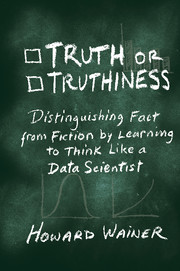Book contents
- Frontmatter
- Dedication
- Contents
- Preface and Acknowledgments
- Introduction
- Section I Thinking Like a Data Scientist
- Section II Communicating Like a Data Scientist
- Section III Applying the Tools of Data Science to Education
- 12 Waiting for Achilles
- 13 How Much Is Tenure Worth?
- 14 Detecting Cheating Badly: If It Could Have Been, It Must Have Been
- 15 When Nothing Is Not Zero: A True Saga of Missing Data, Adequate Yearly Progress, and a Memphis Charter School
- 16 Musing about Changes in the SAT: Is the College Board Getting Rid of the Bulldog?
- 17 For Want of a Nail: Why Worthless Subscores May Be Seriously Impeding the Progress of Western Civilization
- Section IV Conclusion: Don't Try Th is at Home
- Bibliography
- Sources
- Index
12 - Waiting for Achilles
from Section III - Applying the Tools of Data Science to Education
Published online by Cambridge University Press: 05 December 2015
- Frontmatter
- Dedication
- Contents
- Preface and Acknowledgments
- Introduction
- Section I Thinking Like a Data Scientist
- Section II Communicating Like a Data Scientist
- Section III Applying the Tools of Data Science to Education
- 12 Waiting for Achilles
- 13 How Much Is Tenure Worth?
- 14 Detecting Cheating Badly: If It Could Have Been, It Must Have Been
- 15 When Nothing Is Not Zero: A True Saga of Missing Data, Adequate Yearly Progress, and a Memphis Charter School
- 16 Musing about Changes in the SAT: Is the College Board Getting Rid of the Bulldog?
- 17 For Want of a Nail: Why Worthless Subscores May Be Seriously Impeding the Progress of Western Civilization
- Section IV Conclusion: Don't Try Th is at Home
- Bibliography
- Sources
- Index
Summary
A famous paradox, attributed to the Greek mathematician Zeno, involves a race between the great hero Achilles and a lowly tortoise. In view of their vastly different speeds, the tortoise was granted a substantial head start. The race began, and in a short time Achilles had reached the tortoise's starting spot. But in that short time, the tortoise had moved slightly ahead. In the second stage of the race Achilles quickly covered that short distance, but the tortoise was not stationary and he moved a little further onward. And so they continued – Achilles would reach where the tortoise had been, but the tortoise would always inch ahead, just out of his reach. From this example, the great Aristotle, concluded that, “In a race, the quickest runner can never overtake the slowest, since the pursuer must first reach the point whence the pursued started, so that the slower must always hold a lead.”
The lesson that we should take from this paradox is that when we focus only on the differences between groups, we too easily lose track of the big picture. Nowhere is this more obvious than in the current public discussions of the size of the gap in test scores between racial groups. In New Jersey the gap between the average scores of white and black students on the well-developed scale of the tests of the NAEP has shrunk by only about 25 percent over the past two decades. The conclusion drawn was that even though the change is in the right direction, it is far too slow.
But focusing on the difference blinds us to a remarkable success in education over the past twenty years. Although the direction and size of student improvements occur across many subject areas and many age groups, I will describe just one – fourth grade mathematics. The dots in Figure 12.1 represent the average scores for all available states on NAEP's fourth grade mathematics test (with the nation as a whole as well as the state of New Jersey's dots labeled for emphasis), for black students and white students in 1992 and 2011. Both racial groups made steep gains over this time period (somewhat steeper gains for blacks than for whites).
- Type
- Chapter
- Information
- Truth or TruthinessDistinguishing Fact from Fiction by Learning to Think Like a Data Scientist, pp. 143 - 145Publisher: Cambridge University PressPrint publication year: 2015



